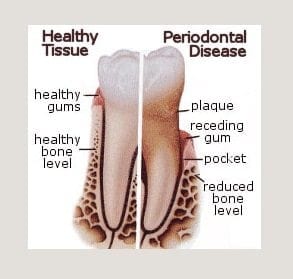More than 3 out of 4 Americans suffer from periodontal disease. Most people have the less serious form, gingivitis. Between 5% and 15% of Americans suffer from the more serious, advanced stage of gum disease called periodontitis. Bleeding gums are one of the dental concerns Dr. Conover addresses at our dental office in Philadelphia, PA.
Bleeding gums are just one of the common signs of gum disease. If you have bleeding gums or other signs of gum disease, contact our office to schedule a periodontal screening and treatment.
Causes of Gingivitis or Gum Disease
Poor oral hygiene habits are the number one cause of periodontal disease. When you do not practice proper dental hygiene, including brushing and flossing and visiting the dentist regularly, plaque forms and builds up on the teeth. This plaque eventually hardens and turns into tartar, which can cause the gums to become inflamed and begin to bleed or feel sore.
If gingivitis is caught early, it can be treated and even reversed. If left untreated, however, it progresses into gum disease. Gum disease is an infection in the gums that causes bone degradation, swollen and painful gums, and potential tooth loss.
Symptoms of Gum Disease

Many people with gingivitis do not experience any pain or symptoms. You should know the symptoms of gingivitis so that you can catch the condition early:
- Changes in the way the teeth fit together
- Formation of deep pockets between teeth and gums
- Bleeding gums during or after brushing
- Shifting teeth
- Persistent bad breath
- Red, swollen, or tender gums
- Receding gums
Please call us as soon as you notice changes in your gum health. We’ll examine your teeth and gums and may take X-rays if needed. Then we’ll find the right treatment for your gums.
Do Bleeding Gums Always Mean Gum Disease?
No, bleeding gums don’t always mean you have gum disease, but they can be a sign of a problem. Your gums may bleed for several reasons:
- Brushing Too Hard: If you brush your teeth with too much force or use a hard-bristled toothbrush, it can irritate your gums and make them bleed.
- Flossing Too Roughly or Inconsistently: If you just started flossing or floss too hard, your gums may bleed at first.
- Vitamin Deficiencies: Not getting enough Vitamin C or Vitamin K can make your gums more likely to bleed.
- Hormonal Changes: Pregnancy, puberty, and other hormonal changes can make gums more sensitive and prone to bleeding.
- Certain Medications: Some medicines, like blood thinners, can make gums bleed more easily.

How to Prevent Bleeding Gums
Keeping your teeth and gums healthy is the best way to prevent gingivitis, which is the early stage of gum disease. When your gums are healthy, they are firm and do not bleed easily. Here are some important steps to take care of your gums and lower your risk of gum disease:
- Brush and Floss: We recommend that you brush your teeth at least twice a day and floss daily. Brushing helps remove plaque and bacteria. When you floss, you clean the spaces between your teeth that a toothbrush can’t reach.
- Eat a Healthy Diet: Limit sugary or starchy foods. Foods high in sugar and starch can feed harmful bacteria in your mouth, increasing the risk of gum problems. Eating plenty of fruits, vegetables, and whole grains can help keep your gums strong.
- Drink plenty of water: Water helps wash away food particles and bacteria that can build up on your teeth and gums. Staying hydrated also keeps your mouth from becoming too dry. Dry mouth can increase your risk of gum disease.
- Don’t Smoke: Quit tobacco products, including cigarettes and chewing tobacco. Smoking and tobacco use weaken the immune system. They also make it harder for your gums to heal.
- Manage stress levels: Stress can weaken your immune system and cause inflammation in your body, including your gums. Finding ways to relax, like exercise, meditation, or hobbies, can help protect your oral health.
Treatment for Gum Disease
Over-the-counter or at-home remedies for bleeding gums are not viable. A dentist should always treat gingivitis or gum disease. Depending on the condition of your gums, Dr. Conover can perform several treatment options for bleeding gums in Philadelphia, PA:
Gingivitis Treatment
Treatment for gingivitis is relatively simple. Plaque is removed from the teeth and gums through a dental cleaning. Antibacterial rinses may be recommended, and patients are advised to follow the prevention tips.
Periodontal (Gum) Disease Treatment
If you have an advanced form of gum disease, our team may need to perform more intensive treatments. These include root planing and scaling to remove bacteria from deep pockets of the gums. In extreme cases, surgery may be necessary.
In some cases, crook or misaligned teeth, ill-fitting crowns or bridges, or other dental restorations can make it difficult to reach built-up plaque or tartar and irritate the gums. If any of these are contributing to your gingivitis or bleeding gums, we recommend correcting these issues with the appropriate restorative dentistry treatment.
Bleeding Gums FAQs
Bleeding gums can indicate a serious condition. Read the answers to these commonly asked questions to learn more.
Are bleeding gums normal during pregnancy?
Bleeding gums during pregnancy can be common. Hormone changes can make your gums more sensitive and more likely to swell or bleed when you brush or floss. This condition is called pregnancy gingivitis. If you’re pregnant and notice bleeding gums, please call Dr. Conover for a cleaning. You can safely get a dental cleaning if you’re pregnant.
Can my diet affect my gum health?
Yes, your diet can affect your gum health. Eating too many sugary snacks or drinks can lead to plaque buildup, which can cause gum disease. When you eat healthy foods like fruits, vegetables, and whole grains, you give your body the vitamins and nutrients it needs to keep your gums strong. Drinking plenty of water also helps wash away sugars and starches that attract harmful bacteria.
How important is flossing for my gum health?
Flossing is very important for your gum health. Brushing your teeth cleans the surfaces, but flossing removes food and plaque from between your teeth and under your gums where our toothbrush can’t reach. If you don’t floss, plaque can build up and cause gum disease. We recommend that you floss every day before you brush your teeth so the fluoride from your toothpaste can reach between your teeth.
How long does gum disease take to heal?
After a few days of treatment, you might expect to see some improvement, but it may take some time for symptoms to go away entirely. Typically, gingivitis disappears within 10 to 14 days in most patients. As the disease progresses, it may become increasingly difficult to treat.
Does gum disease last forever?
If you don’t get treatment for gum disease, it could last a lifetime. Periodontitis will worsen and progress if it is not treated. Call our office right away if you have any signs of gum disease.
Is gum disease painful?
Periodontal disease is often caused by a buildup of plaque, a film of germs that adheres to teeth and hardens. If left untreated, it can cause bleeding gums, painful chewing problems, and even tooth loss in the most severe cases. It can be painful as it progresses.
Can gum disease come back?
Plaque on the teeth and gums is the root cause of gum disease even after periodontal therapy, plaque will re-accumulate on the teeth and gums. Gum disease can return two to four months after treatment if you don’t revamp your oral care routine.
How can I strengthen my gums?
Brushing your teeth at least twice a day and flossing daily are the best ways to strengthen your gums. We also recommend scheduling regular dental appointments and refraining from smoking.
Treat Bleeding Gums in Philadelphia, PA
Dr. Conover is welcoming new patients in Center City Philadelphia and the surrounding communities. Call us at (215) 395-6076 or schedule a consultation online to determine the best type of treatment for you.
